人教版选修八Unit 1语法学案
人教版高中英语选修八Unit 1第5课时(语法)教案
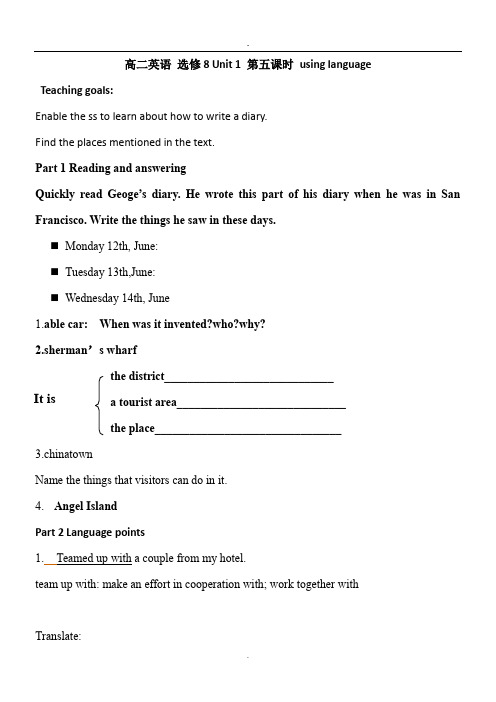
高二英语选修8 Unit 1 第五课时using languageTeaching goals:Enable the ss to learn about how to write a diary.Find the places mentioned in the text.Part 1 Reading and answeringQuickly read Geoge’s diary. He wrote this part of his diary when he was in San Francisco. Write the things he saw in these days.⏹Monday 12th, June:⏹Tuesday 13th,June:⏹Wednesday 14th, June1.able car:When was it invented?who?why?2.sherman’s wharfthe district_____________________________ ArrayIt isa tourist area_____________________________the place________________________________3.chinatownName the things that visitors can do in it.4.Angel IslandPart 2 Language points1.Teamed up with a couple from my hotel.team up with: make an effort in cooperation with; work together withTranslate:He teamed up with an experienced worker in the project.2.It’s a 79km round-trip that takes in all famous tourists spots.take in:___________;__________ __;__________________;_________ ______________;Eg. 1)He had nowhere to live in, so we took him in.2)The dress needs to be taken in.3)They listened to my lecture, but how much did they take in , I wonder?4)Don’t let yourself be taken in by these politicians.思维拓展:连线take off 拆开,拆散take on 贬低, 贬损名誉等take apart 从事,对…..产生兴趣,打听,占用空间或时间take away from 脱下,脱去,起居,休假,离开take up 开始雇佣,露出,承担,接受3.a great many: a large number (of);There are a great many reasons why you shoudn’t do it.remember: it is only used to modify countable nouns.4.formal informal5. feel like doing sth:to have a wish for; want。
人教课标版高中英语选修8 Unit1_Grammar名师教学设计
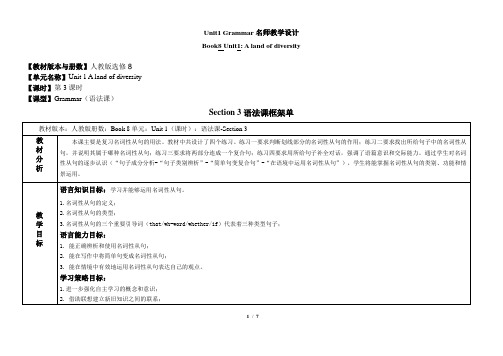
2.T: From the analysis of the sentence patterns, can you tell me what types of noun clauses are there.
S:Noun clauses are classified as subject clause, object clause, predicative clause and appositive clause.
It happened that…碰巧…
It appears that…似乎…
4It is+过去分词+从句
It is reported that…据报道…
It has been proved that…已证实…
It is said that…据说…
it作形式主语和it引导强调句的比较
it作形式主语代替主语从句,主要是为了平衡句子结构,主语从句的连接词有变化。而it引导的强调句则是对句子某一部分进行强调,无论强调的是什么成分,都可用连词that。被强调部分指人是也可用who/whom。例如:
DELC2获取新知识
Step2
Production
(学习
新知)(20mins)
1.Teacher guide Ss to learn the grammar rules of noun clauses.
名词性从句
【概念与分类】在句子中起名词作用的句子叫名词性从句。名词性从句的功能相当于名词词组,它在复合句中能担任主语、宾语、表语、同位语、介词宾语等,因此根据它在句中不同的语法功能,名词从句又可分为主语从句、宾语从句、表语从句和同位语从句。
It hasn’t been decided whether (if) we shall attend the meeting.
人教版高中英语选修八第一单元语法课教学设计.docx
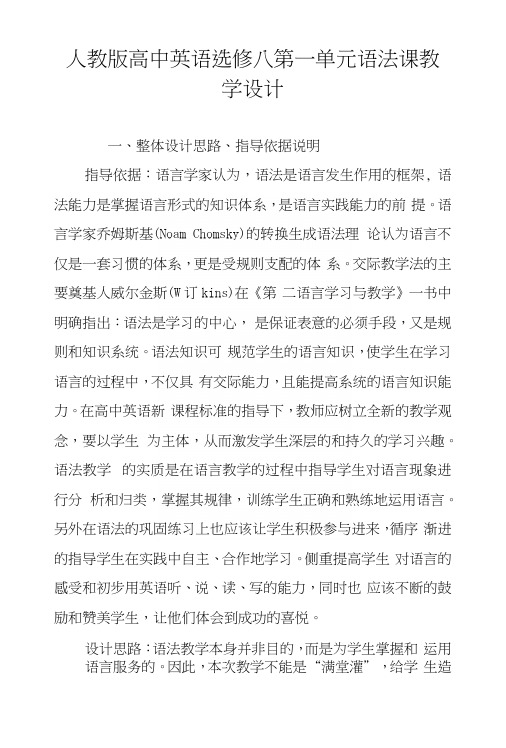
人教版高中英语选修八第一单元语法课教学设计一、整体设计思路、指导依据说明指导依据:语言学家认为,语法是语言发生作用的框架, 语法能力是掌握语言形式的知识体系,是语言实践能力的前提。
语言学家乔姆斯基(Noam Chomsky)的转换生成语法理论认为语言不仅是一套习惯的体系,更是受规则支配的体系。
交际教学法的主要奠基人威尔金斯(W订kins)在《第二语言学习与教学》一书中明确指出:语法是学习的中心,是保证表意的必须手段,又是规则和知识系统。
语法知识可规范学生的语言知识,使学生在学习语言的过程中,不仅具有交际能力,且能提高系统的语言知识能力。
在高中英语新课程标准的指导下,教师应树立全新的教学观念,要以学生为主体,从而激发学生深层的和持久的学习兴趣。
语法教学的实质是在语言教学的过程中指导学生对语言现象进行分析和归类,掌握其规律,训练学生正确和熟练地运用语言。
另外在语法的巩固练习上也应该让学生积极参与进来,循序渐进的指导学生在实践中自主、合作地学习。
侧重提高学生对语言的感受和初步用英语听、说、读、写的能力,同时也应该不断的鼓励和赞美学生,让他们体会到成功的喜悦。
设计思路:语法教学本身并非目的,而是为学生掌握和运用语言服务的。
因此,本次教学不能是“满堂灌”,给学生造成“繁、难、杂”印象。
学习语法最好的方法是在“用” 中学。
因为本节课为语法复习课,学生对所复习内容已经比较熟悉,所以本节课的教学模式可归纳为“再呈现一一再发现一一再归纳一一实践一一活用”。
首先让学生再次发现语法现象,并帮助他们重新归纳出语法结构形式与功能。
最终使学生真正掌握并能活用所学语法结构并应用到实际的读、说、写中去,达到语言学习的最终目的。
具体授课过程缩略图:(见图1)二、教学背景分析教学背景分析:本单元的语法为名词性从句,因为之前名词性从句是连贯初中到高中的英语重点语法概念,也是历年高考英语考试的一个考查热点。
纵观历年高考英语,我们就能发现:英语高考对于名词性从句考查的重点就是名词性从句的引导词的选择、引导词之间的区别、名词性从句的陈述语序以及主从句时态一致性原则等。
选修八unit1语法
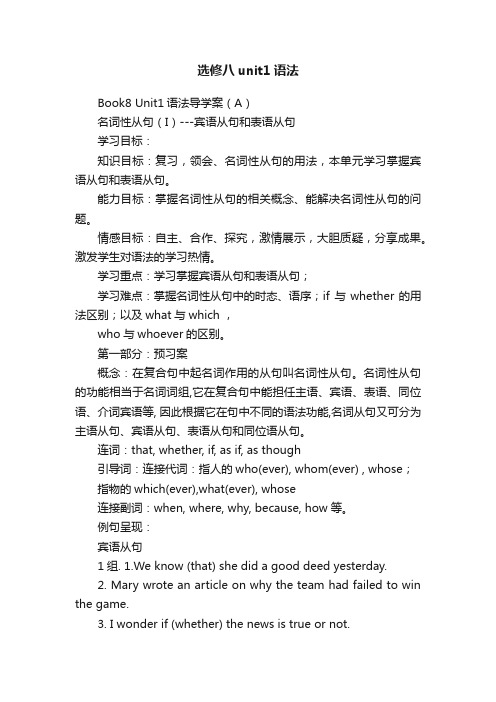
选修八unit1语法Book8 Unit1语法导学案(A)名词性从句(I)---宾语从句和表语从句学习目标:知识目标:复习,领会、名词性从句的用法,本单元学习掌握宾语从句和表语从句。
能力目标:掌握名词性从句的相关概念、能解决名词性从句的问题。
情感目标:自主、合作、探究,激情展示,大胆质疑,分享成果。
激发学生对语法的学习热情。
学习重点:学习掌握宾语从句和表语从句;学习难点:掌握名词性从句中的时态、语序;if 与whether的用法区别;以及what与which ,who与whoever的区别。
第一部分:预习案概念:在复合句中起名词作用的从句叫名词性从句。
名词性从句的功能相当于名词词组,它在复合句中能担任主语、宾语、表语、同位语、介词宾语等, 因此根据它在句中不同的语法功能,名词从句又可分为主语从句、宾语从句、表语从句和同位语从句。
连词:that, whether, if, as if, as though引导词:连接代词:指人的who(ever), whom(ever) , whose;指物的which(ever),what(ever), whose连接副词:when, where, why, because, how等。
例句呈现:宾语从句1组. 1.We know (that) she did a good deed yesterday.2. Mary wrote an article on why the team had failed to win the game.3. I wonder if (whether) the news is true or not.2组. 1. We know (that) she studies English every day.2. We know (that) she studied English last term.3. We know (that) she will study English next year.4. We know (that) she has studied English since 2005.1. She said she enjoyed reading English novels.3组 2. She said the girl was doing some washing .3.She told me that she had never been there before.4. She told me that she would never forgive me.表语从句:4组 1.My suggestion is that we should go shopping.2. It seems that it is going to rain.3.It looks as if it’s going to rain.4.The reason why he was late was that he didn’t catch the early bus.观察以上各组例句,结合语法书,完成以下问题1) 宾语从句的句子结构:____________________________________________________________表语从句的句子结构:____________________________________________________________2)从句中的时态问题在名词性从句中,特别是宾语从句中要注意时态呼应问题,当主句动词是现在时,从句的时态_________________________________;当主句的时态是过去时,从句的时态________________ ____,客观事实除外。
(完整版)人教版高中英语选修8unit1导学案(简案)
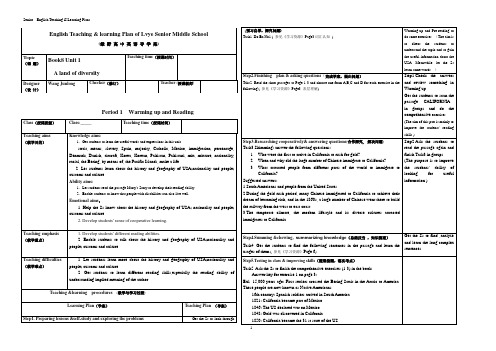
Get the students to scan the passage----CALIFORNIAin groups and do the comprehensiveexercises.
Get the Ss to find ,analyze and learn the long-complex sentences .
Step5.Testing in class& improving skills(随堂检测,落实考点)
Task5. Ask the Ss to finish thecomprehensive exercises (1-3) in the book
A land of diversity
Teaching time(授课时间)
Designer
(设计)
Wang Junlong
Checker(修订)
Teacher(授课教师)
Period 1Warming up andReading
Class(授课班级)
Class:_____
Teaching time(授课时间)
1850:Californiabecame the 31 st state of theUS.
Ex 2.Spanish:in the early 16th century
Russians:early 1800s
Africans:1800s
Chinese:late 1840s/early 1850s
Halians:in the late 19th century
1.Who were the first to arrive inCaliforniato rush for gold?
人教版选修8 第一单元学案及课后练习

Unit 1 A land of diversityLearning aims:1) To learn the words and phrases by heart2) To master the usages of the vocabulary1). These vegetables can be cooked in different _______.2). Only in this _______ can you find out the truth.3). By this _______ I get in touch with him.4). We express our thoughts by _______ of words.5). ______ _______ _______ shall I lend him money!6). The methods of _______ (teach) need _______ (improve).2. majority n.大多数;大半major adj.&n.较大的,主要的;主修,专攻(反义词minority少数;少数民族)(1) _____________________________ doctors agree that smoking is extremely harmful to health.大多数医生认为吸烟对健康极为有害。
2). The majority _________(be) in favour of the proposal. 多数人赞成这个建议。
be in the/a majority 构成大部分/大多数 a majority over sb 超过对方的票数[练习] 按要求填空1). English speakers form the ________ (大多数) of the population.2). Among the members of the committee those who favour the proposed changes are _______ (介词) the majority.3). They had a large majority _______ (介词) the other party at the last election.4). The majority of people _________ (prefer) peace to war.5). The majority of the damage _________ (be) easy to repair.3. applicant n.申请人_______________ n.申请(书);应用;用途apply v. 申请;运用,适用[典例]We had 250 _______________ for the job. 有250人申请这份工作。
人教版高中英语语法学案选修8Unit1 A land of diversity

,[学生用书P226~P228])Ⅰ.单词拼写根据音标及词义写出英文单词1.authority[ɔː'θɒrItI] n.权威;权力(pl) 当局;官方2.aircraft['eəkrɑːft] n. 飞行器;飞机3.luggage['lʌɡIdʒ] n. 行李4.justice['dʒʌstIs] n. 正义;公平5.hardship['hɑːdʃIp] n. 苦难;困苦6.hire['haIə] v t. & n. 租用;雇用7.occur[ə'kзː] v i. 发生;出现8.civil['sIvl] adj. 公民的;国内的9.means[miːnz] n. 手段;方法10.nowhere['nəʊweə] ad v. 无处;到处都无11.grasp[ɡrɑːsp] v t. & n. 抓住;抓紧12.reform[rI'fɔːm] v. & n. 改革13.vice[vaIs] n. & adj. 代理;副职14.slip[slIp] v i. 滑动;滑行n. 滑动15.boom[buːm] n. (人口、贸易的)繁荣v i. 处于经济迅速发展时期16.customs['kʌstəmz] n. 海关,关税17.percentage[pə'sentIdʒ] n. 百分比,百分率18.elect[I'lekt] v t. 选择;决定做某事Ⅱ.单词拓展写出下列单词及其派生词。
1.distinct adj.清晰的;明显的;明确的distinction n. 差别;区分;卓著2.major adj. 主要的majority n. 大多数;大半3.punish v. 处罚;惩罚punishment n. 处罚;惩罚4.indicate v t. 指出;标示;表明;暗示indication n. 指出;标示;表明;暗示5.apparent adj. 显而易见的;显然的apparently ad v. 显然地;显而易见地6.fascinate v. 吸引;使着迷fascinating adj. 迷人的;吸引人的1.live_on继续存在;继续生存2.by_means_of... 用……办法;借助……3.make_a_life 习惯于新的生活方式、工作等4.keep_up 坚持;维持;沿袭(风俗、传统等) 5.back_to_back 背靠背6.team_up_with 与……合作或一起工作7.mark_out 用线画出范围;标出……界线8.take_in 包括;吸收9.a_great/good_many 许多;很多10.apply_for 申请;请示得到1.It is likely that...“很可能……”However,it is likely that Native Americans were living in California at least fifteen thousand years ago.[仿写]很有可能有一些像地球一样的星球,在那里可能也存在生命。
人教版选修8unit1教案

选修8(新课标人教版)教案英语组王宏波Help the students learn how to know the parts of speech according to the suffixes.Teaching important pointsGet the students to know the word about the USA.Teaching difficult pointsGet the students to know the word formation by adding suffixes.Teaching methodsStudy individually, practice in groups.Teaching aidsA computer and a recorder.Teaching procedures & waysStep Ⅰ RevisionAsk the students to discuss the question in Activity 3 on page 3, trying to explain the reasons in their own words and write 3 ~ 4 sentences. Ask them to share their answers and show their opinions.Step Ⅱ SuffixationFirst, ask the students to show their collected suffixes. Ask them to review the function of verbs, nouns and adjectives. And then ask them to fill in the charts with the proper forms of the words by practicing Activity 1 on page 4. At last, check the answers with the whole class.Step III Homework1. Ask the students to finish Activities 1-3 on page 48 in the workbook.2. Ask the students to prepare for the grammar about the Noun Clauses.The Third Period GrammarTeaching goals1. Target languageThe Noun Clauses, occur to2. Ability goalsEnable the students to identify the different types of the Noun Clauses and learn to use them.3. Learning ability goalsHelp the students learn how to use the Noun Clauses.Teaching important points Enable the students to use the Noun Clauses.Teaching difficult pointsEnable the students to distinguish different types of noun clauses.Teaching methodsComparing and practice.Teaching aidsA projector, a computer and a blackboard.Teaching procedures & waysStep Ⅰ RevisionCheck the homework.Step Ⅱ PresentationAt first, get the students to know what a noun clause is and what role it plays in the sentences. Then, discuss noun clauses as objects. Next, give them an example to show what are Noun Clauses and in what situations they should use them. At last show them the sentence structures of the Noun Clauses.Show the following.· That-clauses:I believe that you can learn noun clauses well.· If / whether clauses:The teacher must determine if / whether they are ready to study noun clauses.· Wh-clauses begin with words like who, what, how, whenever, which, etc:First you need to explain what a noun clause is.I know how I can make you learn noun clauses.Step Ⅲ PracticeAsk the students to practice Activities 1~4 on page 5. For Activities 1~2, discuss what role these clauses play in the sentences in pairs. For Activity 3, ask them to make sentences containing noun clauses on their own. For Activity 4, complete the dialogue with the given sentences in pairs. At last, check the answers with the whole class.Go on with the Activities 2-4. Then check the answers with the students.Step IV HomeworkAsk the students to do the following.1. Finish Activity 2 on page 49 in the workbook.2. Sum up all the conjunctions used with noun clauses and compare it with the conjunctions used with attributive clauses. Then tell the differences between them. Practice Activity 2 on page 49 (Workbook).3. Prepare for the “Using Language” part on pages 6~9 and surf the Internet to find the related information.The Fourth Period Integrating skills(Ⅰ)Teaching goals1.Target languagea. 重点词汇和短语luggage, tram, apparent, apparently, slip, bakery, ferry, hire, seagull, insert, react, team up with, mark out, take in, a great / good manyb. 重点句式Talk about traveling to some placesWhere have you visited recently?What is the climate like?What did you think about the people?What other interesting things did you see?That’s interesting / te rrific / marvelous / cool / lovely!You’re exciting / excellent.Good / Creative / Fantastic / Super job!2. Ability goalsEnable students to talk about places and learn to write an email or a postcard.3. Learning ability goalsHelp students learn how to talk about places and learn to write an email or a postcard.Teaching important pointsHow to talk about places.Teaching difficult pointsHow to write an email or a postcard.Teaching methodsListening, speaking and discussion.Teaching aidsA projector, a computer and a recorder.Teaching procedures & waysStep Ⅰ RevisionCheck the homework.Step Ⅱ Listening and speakingListeningAsk the students to listen to a conversation about the George’s tour around California. Then ask them to practice Activities 1~4 on pages 6~7. For the first time, ask the students to number the things they talk about.Check the answers by asking some students to read the completed postcard.Ask the students to listen to the tape and discuss the questions in pairs and write some of the things Christie says in pairs.SpeakingFor Activity 5, let them discuss in groups of 4 and later ask some of them to give their opinions. Step Ⅲ ReadingAsk the students to look at the given photos and read the George’s diary on pages 8 quickly. Then practice Activity 1 and fill in the chart in pairs.Ask the students to check the answers with their partners.For Activity 2, ask students to rea d the George’s diary on page 8 carefully and then answer the questions in pairs. Check the answers with the whole class.Ask the students to read the diary again by themselves. Then discuss in groups of 4 and practice Activities 3~4. A few minutes later, ask some of them to show their work.Sample answers:Reasons for omitting:1. Some unimportant, unnecessary, uninteresting little words like pronouns “we”, “I”, articles “a”, “the”, or prepositions. If omitted, the meaning can’t be affected and misunderstoo d by others.2. Just keep the key words without explaining more in details.Step Ⅳ HomeworkAsk the students to finish Activity 5 on page 9.The Fifth Period Extensive readingTeaching goals1. Target languagea. 重点词汇和短语consider, achievement, personality, enthusiastic, autobiography, musician, recording, trumpet, funeral, ceremony, coffin, march, ceremonyb. 重点句子He was noticed by... called... who... to teach... and to find...He spoke publicly about..., using his fame to help...2. Ability goalsEnable the students to find the topic of each paragraph and find the clue to show the important events.3. Learning ability goalsHelp the students learn how to find the topic of each paragraph and find the clue to show the important events.Teaching important pointsHow to find the clue to show the important events.Teaching difficult pointsHow to find the topic of each paragraph.Teaching methodsSkimming, scanning and discussion.Teaching aidsA recorder, a computer and a projector.Teaching procedures & waysStep Ⅰ RevisionCheck the homework by asking some students to show their work.Step Ⅱ Listening (Ⅰ)First, ask the students to listen to the tape and complete the notes. Check the answers by asking some students to read their notes.Then get them to discuss the questions in Activity 2 and talk about New Orleans.Ask the students to tick the boxes in Activity 3 and complete Activity 4; complete the activities after listening again.Then check the answers with the whole class.Step ⅢPre-readingT: “You can’t play anything on modern trumpet that doesn’t come from him. I can’t even remember a time when he sounded bad playing the trumpet. Never. Not even one time. He had great feeling up in his playing and he always played on the beat. I just loved the way he played and sang.” This is a comment about a jazz musician. Can you guess who the jazz musician was?S1: Louis Armstrong. I still think no one can beat Louis Armstrong and Chet Baker when it comes to trumpets, and when it comes to saxophone, Buddy Arnold is my fellow anything.T: What else do you know about him?S2: Louis Armstrong was the greatest of all Jazz musicians.S3: Armstrong defined what it was to play Jazz. His amazing technical abilities, the joy and spontaneity, and amazingly quick, inventive musical mind still dominate Jazz to this day.T: He was the grandfather of jazz. He was very successful because he always thought, “What we play is life.” Today we’re going to learn more about the famous musician.Step ⅣReadingSkimmingAsk the students to read through the whole passage and then do Activity 1 on page 52 and discuss the main topic of each paragraph in groups of 4. At last, check the answers with the whole class. Show the following on the screen.ScanningFor Activity 2, get the students to read the text again and then work together with their partners to make a time c hart to show the important events in Louis Armstrong’s life. Give them a few minutes to fill in the form. Check the answers with the whole class.Show the following on the screen.Step Ⅴ Homework1. Ask the students to read the passage again after class and do Activity 3 and list the reasons why the writer says that Louis Armstrong was considered great.2. Ask the students to talk about and write about some places in China.The Sixth Period Integrating skills(Ⅱ)Teaching goals1. Target languagea. 重点词汇和短语nationality, location, geographical fractures, production, interview, cultureb. 重点句式Talk about placesWhen did people first live there?What’s the climate like?Why is it so warm/cold/dry/wet there?What’s the population of the city or province?How many nationalities live there?What is the most important festival there? How do they celebrate it?2. Ability goalsEnable the students to talk about and write about places.3. Learning ability goalsHelp the students learn how to talk about and write about places.Teaching important pointsHow to talk about places.Teaching difficult pointsHow to write about places.Teaching methodsDiscussion.Teaching aidsA projector, a computer and a recorder.Teaching procedures & waysStep Ⅰ RevisionCheck the homework. First ask the students to discuss Activity 3 in groups of 4. Then share the reasons why the writer says that Louis Armstrong was considered great.Step Ⅱ TalkingFor Activity 1 on page 47, ask the students to discuss a city or province in China that has amixture of different cultures in groups of 4, filling in the given chart and answering the questions in the textbook.Step Ⅲ Speaking and writing taskAsk the students to read the tips and steps given in the textbook and talk about a Chinese city, province or zone in groups of 4. Then ask them to write a description.Step Ⅳ Homework: ProjectAfter class, ask the students to study small pieces of the USA, its culture and its people and then put all the pieces together to form a more complete picture. In this project, each student should choose a different aspect of America to research and then present his or her information to the rest of the class. They can use the library or search for information on the Internet.Unit 2 CloningⅠ. 单元教学目标Skill GoalsTalk about cloningPractice expressing and supporting an opinionUse the appositive clauseWrite a composition about cloningⅡ. 目标语言功能句式Expressing and supporting an opinion I’m happy to accept... but...I would never accept... I’m not bothered about...I don’t mind but...I hope you’ll carry on...Are you sure you want to...? I agree with you that...Is it fair to...? Do you think it is wise to...?I think you should... Well done to you for... I don’t understand why you don’t...I can’t help thinking...I could never agree to...词汇四会词汇Differ exact twin commercial straightforward undertake breakthrough procedure carrier cast altogether arbitrary correction object objection medium obtain attain moral conservative forbid accumulate constitution compulsory opera chorus loaf flour owe shortly retire bother assumption regulation strike initial vain resist drawback merely decoration unable feather turkey claw adore hatch reasonable 2.词组cast down, object to, the media, in favour of,(be)bound to(do)..., from time to time, bring back to life, pay off, in vain结构:Appositive clause — that 可引导同位语从句重点句子:It is a way of... P11 The fact is that... P11The question that occurred ... P12 The advantage is that... P15The First Period ReadingStep I Lead-inLook at picturesT: Look at the pictures and discuss which ones are natural clones and which ones are man-made. Then explain how they differ.S: I think the twins are natural clones and the Dolly sheep is man-made.T: You are right! Can you explain how they differ?S: The twins were born at the same time, but the Dolly sheep is man-made.T: Anything else? Who want have a try?S: I think the identical dog is man-made.T: Good job!Step Ⅱ Pre-readingBefore class, ask the students to search for some information about this topic. Now show your questions on the screen, and then let them discuss with each other.Questions about cloning:1. What is a clone?2. How is a clone produced?3. What benefits can humans gain from cloning?4. What problems may arise when humans are cloned?5. Should we clone human?6. Could cloning replace sex as the means of creating new human life?7. Could a parent clone a child who is dying of a terminal illness?Suggest answers:1. It is a way of making an exact copy of another animal and plant.2. This happens in plants when gardeners take cuttings from growing plants to make new ones, and when small parts of a plant are taken and gown in a laboratory. It also happens in animals when twins identical in sex and appearance are produced from the same original egg.3. It can help cure disease and can help couples who have no baby to bear a new baby.4. There may be more bad people like Hitler.5. In my opinion, I do not agree, for it may cause many moral problems.6. No. Because cloned human has the same quality as the real human, natural born baby’s quality is higher than his parents.7. No. The cloned baby also has the disease.Step Ⅲ While-readingGet the students to comprehend the passage quickly and accurately and meanwhile help the students form a good habit of reading.divide the whole passage into several parts and find out the main idea of each part.Show the following.Para. 1 Cloning is a way of making an exact copy of another animal and plant.Para. 2 Cloning has two major uses.Para. 3 The problems of Dolly.Para. 4 The effect of Dolly.Para. 5 It is forbidden to clone human being.Step Ⅳ Post-readingAsk the students to read the passage again to finish three tasks.T: Now let’s listen to the tape. While listening, pay more attention to the correct pronunciation and tone. Then read the text by yourselves to get the answers to the three tasks. You can work in groups.T: First, what are the problems or dangers of cloning?S: Let me have a try! First, the cloned animals have the same illness of the old animals and the same goes with the other species. Second, the cloned animals have short life and can cause moral questions.T: You are right! And what are the advantages of cloning?S: I know! Firstly, gardeners use it all the time to produce commercial quantities of plants. Secondly, it is valuable for research on new plant species and for medical research on animals. Third ly, it suddenly opens everyone’s eyes to the possibility of using cloning to cure serious illnesses, and even producing human beings.T: What is the writer’s opinion? What do you think is the writer’s point of view in this reading passage? Is it in favour of cloning or against it?S1: I think the writer is in favour of it, because there are many advantages of cloning. It can help people solve many problems in our daily life.S2: I think the writer doesn’t agree with it, because if the cloning technology can be used in an evil way, it can cause much trouble to our society.T: The next question: What is your opinion of cloning? Give the reasons.S1: As a coin has two sides, everything has two aspects. First, if the cloning is used in a correct way it can bring many conveniences to us. Such as: curing serious illnesses and being used to produce commercial qualities of plants. On the other hand, if the cloning is used in an evil way it can cause much troubles: such as moral questions.S2: My view on cloning and nuclear transfer is that it is ethical. So actually I find no reason to clone presently. I have this opinion currently, because scientists are unable to successfully clone using nuclear transfer as of today.Step Ⅴ HomeworkAsk the students to do the following.1. Complete the exercises on page 13.2. Recite the key sentences in the text.3. What is Clone? You might not believe it, but there are human clones among us right now. Have you ever wished you could have a clone of yourself to do homework while you hit the skate park or went out with your friends? Imagine if you could really do that. Where would you start?The Second Period ListeningStep I Revision1. Greetings2. RevisionStep Ⅱ Pre-listeningWork in groups to discuss how we should behave towards the human clones.T: Before human clones become part of our life, perhaps we should spend some time thinking about how we should behave towards them. Now, work in groups to discuss the followingquestions.Show the following.1. How would you treat human clones?2. Do you think they should have legal and political rights, such as getting married or voting?3. Do you think they are separate people or part of the original donor?Sample answers:1. I will treat them as normal people.2. Yes, I think they should have the legal and political rights.3. I think they are separate people.Step Ⅲ ListeningThe students are asked to read fast the questions and multiple answers to find out the listening points first, and then listen to the tape twice to choose the best answer.Step Ⅳ Listening task (P57)First, ask the students to read these sentences and then listen to the tape and decide if they are facts or opinions. Play the recording and then check the answers with the class.Sample answers:Arguments for cloning pets:1. Favorite pets can live forever as clones.2. It is moral to clone pets for their owners.Arguments against cloning pets:1. Many people don’t agree with cloning.2. Some people think that cloning pets is selfish.Step Ⅴ HomeworkT: Boys and girls, today we have listened to some materials about cloning. I do hope you can listen to the materials again after class so that you can get very familiar with them. Besides, please preview the reading. Now class is over. Goodbye, everyone.The Third Period SpeakingStep Ⅰ Lead-inStep Ⅱ Read and answer (P16)To answer these three questions, teacher can give the students some examples as explanation, for example, Question 1.T: Now think about this question: if in the world there is only one sheep and human beings want to clone more. Some days later a Dolly appears, then many more. But one day all sheep get the same deadly disease. Now please think about what the results are.S: Maybe they would all die.T: Why?S: Because all sheep have the same arrangement of genes.T: Right. Now can you answer Question 1? Why shouldn’t you clone an extinct animal unless there is enough diversity in the group?S: It is useless to clone an animal if there is not enough diversity in the group for it to overcome illnesses.T: Why is it wrong to clone an extinct animal if it would have to live in a zoo?S: If the cloned animals have to live in the zoo, it is unfair to them. They need freedom.T. Why can’t you clone the DNA of animals that have be en extinct longer than 10,000 years?S: Dinosaurs disappeared 65,000,000 yeas ago. So the chance of dinosaurs returning to the earth is merely a dream.Step Ⅲ Discussion (Question 2)This is a speaking task. Ask the students to have a discussion in groups, organize their words properly, and give vivid description of the chosen animals.T: Now look at the table on page 16, discuss in pairs which extinct animals described are worth restoring by means of cloning. Choose one animal and use the information to help you argue why this animal should be restored to the earth.Give the students six minutes to discuss.Step Ⅳ Writing a report (P17)Deal with Questions three and four. Divide the whole class into four groups. Then they can have a competition.T: Now everyone, imagine all of you are owners of your chosen animal. Now work together, and give us a vivid description of your pet, then I will decide which one is the best to be resorted to the earth.Several minutes later, the students give performances. At the same time, list some major points on the blackboard.T: Well done everyone. It is really hard for me to choose, let us vote OK?Step Ⅴ TALKING (P55)Ask the students to talk about the questions with the teacher’s help.T: Look at the questions on page 54. Do you know how to show your opinion? You can discuss the following questions with your partner and use these expressions on page 54.1. How would you feel about having a clone of yourself in the family?2. What problems did you have growing up and how can you help him / her avoid them.Step Ⅵ HomeworkT: Write down your feelings and attitudes towards clone. Combine them into a composition.The Fourth Period GrammarStep Ⅰ RevisionCheck the students’ homework.Step ⅡGrammarT: Do you know the appositive clauses? Please pick out three more examples from the reading passage.Sample answers:The fact is that they are natural clones of each other.The whole scientific would follow the progress of the first successful clone, Dolly the sheep. Altogether Dolly lived for six years, half the length of the life of the original sheep.T: Now let me explain something about the appositive clauses. The appositive clause is a clause used as an appositive. The clause is an explanation to the noun before. The appositive clause belongs to noun clauses. Most of the appositive clauses may be introduced by the conjunction that.A content clause is frequently in apposition with such nouns as fact, news, idea, thought, question, reply, report, remark, hope, belief, suggestion etc.Some examples:Nobody shares my belief that he was mad.My suggestion that he was mad was not accepted.They are familiar with the opinion that all matter consists of atoms.Where did you get the idea that I could not come?We haven’t yet settled the question where we are going to spend our summer vacation.The suggestion came from the chairman that the new rule should be adopted.T: The words the fact are often inserted in front of an object clause when the clause cannot be conveniently connected with the verb either directly or by means of the representative it.This cannot hide the fact that he is growing old.We must face the fact that we are living in a revolutionary world.Some supplements:同位语从句与that引导的定语从句1) 从先行词看同位语从句与名次之间在逻辑上是“主语+be+表语”的关系。
高中英语UNIT1学案1新人教版选修8
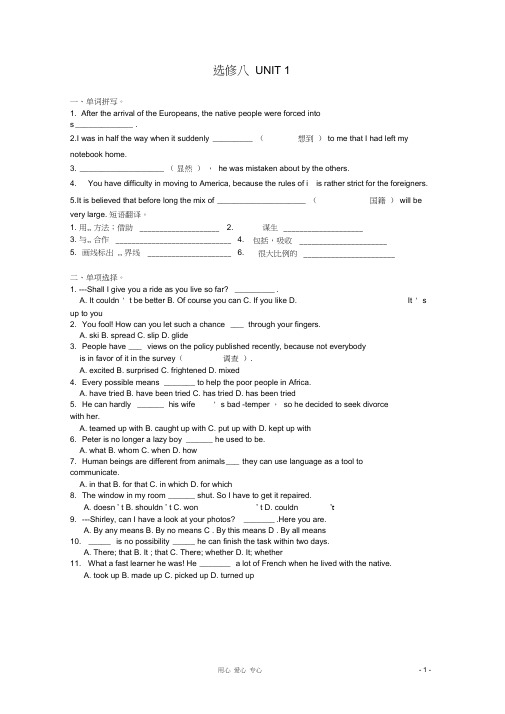
选修八 UNIT 1一、单词拼写。
1. After the arrival of the Europeans, the native people were forced into s _____________ .2.I was in half the way when it suddenly _________ ( 想到 ) to me that I had left mynotebook home.3. ___________________ ( 显然 ) , he was mistaken about by the others.4.You have difficulty in moving to America, because the rules of i is rather strict for the foreigners.5.It is believed that before long the mix of ____________________ ( 国籍 ) will bevery large. 短语翻译。
1. 用,, 方法;借助 ____________________2.3. 与,, 合作 _____________________________4.5. 画线标出 ,, 界线 _____________________6. 二、单项选择。
1. ---Shall I give you a ride as you live so far? _________ .A. It couldn ' t be betterB. Of course you canC. If you likeD.It ' sup to you2. You fool! How can you let such a chance ___ through your fingers. A. ski B. spread C. slip D. glide3. People have ___ views on the policy published recently, because not everybody is in favor of it in the survey ( 调查 ). A. excited B. surprised C. frightened D. mixed4. Every possible means _______ to help the poor people in Africa. A. have tried B. have been tried C. has tried D. has been tried5. He can hardly ______ his wife ' s bad -temper , so he decided to seek divorce with her.A. teamed up withB. caught up withC. put up withD. kept up with 6. Peter is no longer a lazy boy ______ he used to be. A. what B. whom C. when D. how7. Human beings are different from animals ___ they can use language as a tool to communicate.A. in thatB. for thatC. in whichD. for which 8. The window in my room ______ shut. So I have to get it repaired. A. doesn ' t B. shouldn ' t C. won ' t D. couldn 't 9. ---Shirley, can I have a look at your photos? _______ .Here you are.A. By any meansB. By no means C . By this means D . By all means 10. _____ is no possibility _____ he can finish the task within two days.A. There; thatB. It ; thatC. There; whetherD. It; whether11. What a fast learner he was! He _______ a lot of French when he lived with the native.A. took upB. made upC. picked upD. turned up谋生 ____________________包括,吸收 ______________________ 很大比例的 _______________________12. --- Howmuch do you think the skirt will __________ ? ----Not much. It is ________ 20 dollars at most.A. cost; worthB. worth; costC. take; costD. n eed; worth 13. __ water is needed. Which of the following isright ?A. Quan tities ofB.A qua ntity ofC. A good manyD.A great nu mber of 14. ---Do you believe Joh n will beat the other players and win the match? ----Of course. I am sure he can ____ it. A. beat B. take C. bring D. make15. The professor can hardly find sufficie nt gro unds __ his argume nt in favour of the new theories.A. on which to baseB. which to base onC. on what to baseD. that to base on三、完型填空。
人教课标版高中英语选修8 Unit1_语言点名师教学设计
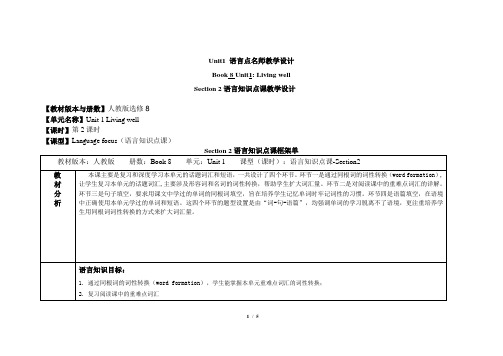
S: Do the exercises respectively and check the answers with each other.
2. Teacher asks some students to do Ex. 3 on Page 4 of Students’Book.
语言能力目标:
1. 能熟练进行重难点词汇的词性转换;
2. 能准确地用英语解释英语单词(paraphrase);
3. 能在情境中有效运用所学的词汇并表达自己的观点。
学习策略目标:
1. 能将所学的单词和句型运用到实际生活中去;
2. 能联系学过的词汇,用词性转换的方式扩大词汇量;
3. 能积极主动地探索单词记忆的方法。
通过构词法学习单词,帮助学生扩大词汇量及运用构词法猜测词义等。
(二)游戏教学法
采用字链(word chain)和扩句的游戏复习单词,激发学生记单词的学习兴趣和提高学生记单词的有效性。
字链(word chain)游戏即要求学生用本单元学过的单词或短语进行比赛。一个学生说出一个单词,另一个学生要说出以这个单词的为字母为首字母的单词,其他学生依次类推,坚持到最后的学生为胜。本课时学习的是词性转换,因此学生可以用到同根词的不同词性。
2.学生是否能用英语准确表达单词的含义。
DELC2
获取新知识
Step2
Review key words and expressions
(复习重点词汇和表达方式)(20mins)
1. Teacherguides Ss to learn the key language points in detail.(详见PPT)
高中英语 Unit1《语法-名词性从句》教案 新人教版选修8
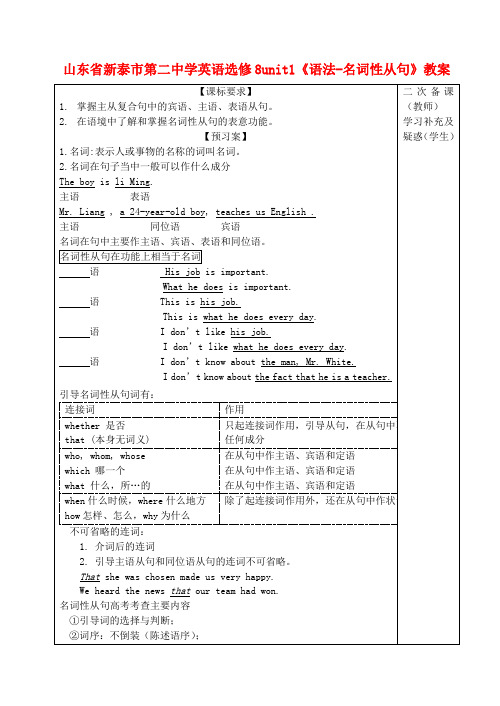
1._______ he said is true. A. What B. That C. Which D. Whether 2._______ he said at the meeting astonished everybody present. A What B. That C. The fact D. The matter 3. ____ his dream of going to college will come true is uncertain A. That B. Whether C. If D. Even if 4.________ we'll go camping tomorrow depends on the weather. A. If B. Whether C. That D. Where 5.________ you don't like him is none of my business. A. What B. Who C. That D. Whether 6.______makes this shop different is that it offers more personal services. A. What B. Who C. Whatever D. Whoever 小结二: 主语从句的语序 (1)主语从句构成有两种 a. That + 陈述句 That light travels in straight lines is known to all. b. 疑问词+句子的剩余成分 How he was successful is still a puzzle. (2) 为避免主语冗长, ,用 it 作形式主语,主语从句放在后面作真正的主语. 1.It is certain that he will succeed. 2.It is not known whether he will go there. It + be + 形容词 + that 从句 It is necessary that… 有必要… It is important that …. 重要的是… It is obvious that…… 很明显…… 注意:从句语气要用虚拟语气 Eg. It is necessary that a new plan should be designed at once. It + be + -ed 分词 + that 从句 It is believed that… 人们相信… It is known to us/all that …. 众所周知… It has been decided that…… 已经决定…… Eg. It’s reported that no one was killed in the earthquake. It + be + 名词 + that 从句 It is common knowledge that… …是常识 It is a surprise that …. 令人惊奇的是… It is a fact that…… 事实是…… (1) It is a pity that we can’t go.
人教版英语选修8unit1学案

重点词汇1.majority n.大多数,大半the / a majority of +名词,谓语动词的数与of后面的名词相一致。
the majority 单独作主语时,谓语动词用单复数均可。
in the /a majority 占大多数e.g. They had a large majority over the other party at the last election.拓展: major adj. 主要的; 较大的minor adj. 较小的minority n. 少数【活学巧用】例题1. The majority of crimes that occurred in this area _____ because of taking drugs.A. are said to commitB. are said to have been committedC. is said to have committedD. is said to be committed2. elect vt. 选择;决定做某事;选举某人adj. 候任的elect to do…选择或决定做某事elect sb. (to be/ as) 选举某人为拓展: election n. 选举;选择【活学巧用】例题2. I’m afraid you have no _____ but to come along with us.A. possibilityB. permissionC. choiceD. election3.occur vi. 发生;出现;存在类似happen, take place, come aboutoccur to sb (主意) 浮现于脑海中;被想到;被想起;(某人)想到……sth. occurs to sb.It occurs to sb. that【活学巧用】例题3. Has it ever ____ you that this old book might be valuable?A. occurredB. occurred toC. struck toD. come to4. indicate vt. 指出;标示;表明;暗示indicate sth (to sb) 指示;指出;标示indicate that/wh- 表示……;示意……拓展:indication n. 指出;表明indicative adj.指示的;暗示的e.g. Research indicates that men find it easier to give up smoking than women.【活学巧用】例题4. In the end, they found a great deal of evidence _____that the so-called gentleman was a thief.A. indicateB. to be indicatingC. t o indicateD. indicating重点短语1.live on继续存在;继续生存;(人或动物)以……为食live by doing sth 靠做某事物为生live for sth 以某事物为生活目标live up to sth 符合;不辜负live with sth 接受或容忍某现象live through 经历过;经历……之后还活着;度过live a... life 过着……的生活feed on (动物)以……为食2. by means of…用……办法;借助……by all means 当然by no means 决不by this means 用这种方法注意:means为单复同形【活学巧用】例题5. —Do you think we should put an ad in the paper for the lost child?—Yes,_____.A. that’s all rightB. by all meansC. it just dependsD. never mind例题6. Every means _____ prevent the water from _____.A. are used to;pollutingB. get used to; pollutingC. is used to; pollutedD. is used to; being polluted3. make a life 习惯于新的生活方式、工作等;谋生拓展:lose one’s life 失去生命come to life 苏醒过来bring… back to life 给某人活力;使……恢复生机4.team up with 与……合作或一起工作keep up with 跟上,不落在后面catch up with 赶上put up with 忍受end up with 以……告终come up with 想出;提出be fed up with 对……厌烦5.mark out画线;标出……界线help out 帮助某人摆脱困境test out 考验;试验pick out 挑出;拣出figure out 计算出leave out 省去;遗漏;不考虑cut out 切下;省略;停止break out (战争、灾难等)突然爆发try out 测试;试验make out 理解;辨认出let out 发出;放走;泄露find out 查明set out 出发;开始着手于work out 计算出;解决;锻炼;成功live out 活过,实践;实现turn out 结果是;证明是run out 用完;用尽give out 分发;发出;用完;发布sort out 整理;挑出carry out 执行6.take in包括;吸收;欺骗;理解;改小take apart 拆开take down 拿下,取下;拆卸;记下take back 取回;收回说过的话take care of 照料,保管take medicine 服药take over 继承,接收,接管take it easy 别紧张,慢慢来take up 开始从事;占用(时间或空间) take on 承担;呈现;雇佣take off 脱下;起飞;迅速走红take one’ s time不急,慢慢干take one’ s place入座;代替例题7. Shanghai World Expo attracts _____ the visitors from all over the world.A. a great manyB. a great deal ofC. a great many ofD. a large amount of单元知识点练习1.As senior students, it is important to _____ a good state of mind.A. keep upB. carry outC. get inD. take up2. Travelling has really helped to broden our _____ , which makes us wiser.A. differencesB. horizonsC. shortcomingsD. hardships3. Independent innovations has brought us a _____ in profits, 40% higher than in the traditionalway.A. boomB. failureC. decreaseD. suffering4. Either you or he _____ to be invited to the party.A. is likelyB. are likelyC. is possiblyD. are possible5. Which director was he _____ when talking about the latest film?A. looking upB. giving outC. applying forD. referring to6. It’s not _____ books you read but the way _____ you read them that decides how successfullyyou gain knowledge.A. the number of ; /B. a number of ; in whichC. a good many ; whichD. quite a few ; in which7. Some students find it hard to _____ the new teacher’s dialect.A. take inB. take upC. take overD. take on8. A good idea _____ me, and I quickly picked up the phone to tell Jack about it.A. struckB. appearedC. happenedD. occurred9. A large _____ of the hotel’s income _____ from the visitors to the lake nearby.A. percentage ; areB. percentage; isC. percent; areD. percent; is10. The position, however, _____ you are applying, is not quite a well-paid one.A. thatB. whichC. for whichD. to which11. He was _____ as a salesman in Samsung Company, but was soon _____ because of his frequentabsence.A. employed; firingB. hired; firingC. hiring; being firedD. employed; fired12. An uncle of mine lived _____ cancer for over 20 years, and died _____ January at the age of 86.A. for; fromB. with ; ofC. with; inD. against; with13. The suggestion they all objected to _____ to be effective finally.A. provingB. proveC. had provedD. proved14. Winning a gold medal in the Asian Games is an unforgettable moment for her, _____ she willnever forget.A. thatB. whatC. itD. one15. When I got there, I found the bookshop pulled down—the shop owner was nowhere_____.A to be found B. to find C. finding D. found例题1-例题7BCBDBDC单元知识点练习1-5 ABAAD 6-10 AAABC 11-15 DCDDA例题1-例题7BCBDBDC单元知识点练习1-5 ABAAD 6-10 AAABC 11-15 DCDDACommit及物动词vt.1.犯(罪),做(错事等)I committed an error in handling the business.我在处理这一业务时犯了一个错误。
选修8 Unit1 语言点 导学案
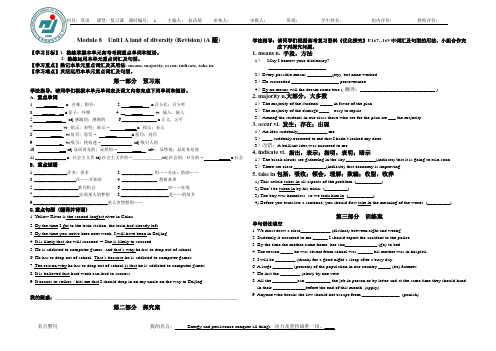
Module 8 Unit1 A land of diversity (Revision) (A版)【学习目标】1. 熟练掌握本单元高考考纲重点单词和短语。
2. 熟练运用本单元重点词汇及句型。
【学习重点】熟记本单元重点词汇及其用法: means, majority, occur, indicate, take in.【学习难点】灵活运用本单元重点词汇及句型。
第一部分预习案学法指导:请同学们根据本单元单词表及课文内容完成下列单词和短语。
A. 重点单词1. ______ n. 苦难,困苦;2. ______ n.百分比;百分率3. ______ __ n.侄子;外甥4. __ _____ vt. 插入;嵌入5. _______ adj.感激的;感谢的6.________________ n.正义,公平7. vt. 指示;表明;暗示→_____ n. 指示;表示8. _____ vt.处罚;惩罚→_____ n.惩罚;处罚9. _ vt.吸引;使着迷→adj.吸引人的10. ___ adj.显而易见的;显然的→____ adv.;显然地;显而易见地11.______________ n. 社会主义者adj.社会主义者的→____________adj.社会的;社交的→_____ n.社会B.重点短语1. _______________许多;很多2. ______________ 用……办法;借助……3. ___________________在……开始时4. ________________ 想做某事5. ____________________抓住机会6. _____________________对……宣战7._____________________实现某人的梦想8.______________________是……的故乡9.__________________________________某人突然想到……C.重点句型(翻译并背诵)1. Yellow River is the second longest river in China.2. By the time I got to the train station, the train had already left.3. By the time you arrive here next week, I will have been in Beijing.4. It is likely that she will succeed. = She is likely to succeed.5. He is addicted to computer games, and that’s why he has to drop out of school.6. He has to drop out of school. That’s because he is addicted to computer games.7. The reason why he has to drop out of school is that he is addicted to computer games.8. It is believed that hard work can lead to success.9. It occurs to/strikes / hits me that I should drop in on my uncle on the way to Beijing.我的疑惑:_________________________________________________________________________第二部分探究案学法指导:请同学们根据高考复习资料《优化探究》P.167--169中词汇及句型的用法,小组合作完成下列探究问题。
人教版高中英语选修八第一单元语法课教学设计

人教版高中英语选修八第一单元语法课教学设计作者:侯美来源:《校园英语·上旬》2014年第02期一、整体设计思路、指导依据说明指导依据:语言学家认为,语法是语言发生作用的框架,语法能力是掌握语言形式的知识体系,是语言实践能力的前提。
语言学家乔姆斯基(Noam Chomsky)的转换生成语法理论认为语言不仅是一套习惯的体系,更是受规则支配的体系。
交际教学法的主要奠基人威尔金斯(Wilkins)在《第二语言学习与教学》一书中明确指出:语法是学习的中心,是保证表意的必须手段,又是规则和知识系统。
语法知识可规范学生的语言知识,使学生在学习语言的过程中,不仅具有交际能力,且能提高系统的语言知识能力。
在高中英语新课程标准的指导下,教师应树立全新的教学观念,要以学生为主体,从而激发学生深层的和持久的学习兴趣。
语法教学的实质是在语言教学的过程中指导学生对语言现象进行分析和归类,掌握其规律,训练学生正确和熟练地运用语言。
另外在语法的巩固练习上也应该让学生积极参与进来,循序渐进的指导学生在实践中自主、合作地学习。
侧重提高学生对语言的感受和初步用英语听、说、读、写的能力,同时也应该不断的鼓励和赞美学生,让他们体会到成功的喜悦。
设计思路:语法教学本身并非目的,而是为学生掌握和运用语言服务的。
因此,本次教学不能是“满堂灌”,给学生造成“繁、难、杂”印象。
学习语法最好的方法是在“用”中学。
因为本节课为语法复习课,学生对所复习内容已经比较熟悉,所以本节课的教学模式可归纳为“再呈现——再发现——再归纳——实践——活用”。
首先让学生再次发现语法现象,并帮助他们重新归纳出语法结构形式与功能。
最终使学生真正掌握并能活用所学语法结构并应用到实际的读、说、写中去,达到语言学习的最终目的。
具体授课过程缩略图:(见图1)二、教学背景分析教学背景分析:本单元的语法为名词性从句,因为之前名词性从句是连贯初中到高中的英语重点语法概念,也是历年高考英语考试的一个考查热点。
新课标人教选修8unit1学案
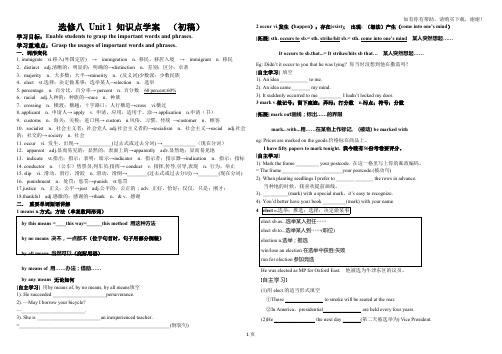
如有你有帮助,请购买下载,谢谢!选修八Unit 1 知识点学案(初稿)学习目标:Enable students to grasp the important words and phrases.学习重难点:Grasp the usages of important words and phrases.一.词形变化1. immigrate vi.移入(外国定居) →immigration n.移民,移居入境→immigrant n. 移民2.distinct adj.清晰的;明显的;明确的→disti nction n.差别;区分;卓著3.majority n.大多数;大半→minority n.(反义词)少数派;少数民族4.elect vt.选择;决定做某事;选举某人→election n.选举5. percentage n. 百分比,百分率→ percent n.百分数60 percent:60%6.racial adj.人种的;种族的→race n.种族7.crossing n.横渡;横越;十字路口;人行横道→cross vi.横过8. applicant n.申请人→ apply v. 申请,应用,适用于,涂→ application n.申请(书)9.customs n.海关;关税;进口税→ custom n.风俗,习惯,传统→customer n.顾客10.socialist n.社会主义者;社会党人adj.社会主义者的→socialism n.社会主义→social adj.社会的;社交的→ society n.社会11. occur vi.发生,出现→_____________(过去式或过去分词) →_____________(现在分词)12.apparent adj.显而易见的;显然的;表面上的→apparently adv.显然地;显而易见地13.indicate vt.指出;指示;表明;暗示→indicator n.指示者;指示器→indication n.指示;指标14. conductor n. (公车)售票员,列车员,指挥→ conduct v.指挥,传导,引导,表现n.行为,举止15. slip vi.滑动,滑行,滑跤n. 滑动,滑倒→________(过去式或过去分词) →________(现在分词) 16.punishment n.处罚;惩罚→punish vt.惩罚17.justice n.正义;公平→just adj.公平的;公正的; adv.正好,恰好;仅仅,只是;刚才;18.thankful adj.感激的;感谢的→thank n.& v.感谢二.重要单词短语讲解1 means n.方式;方法(单复数同形词)by this means =____this way=______this method 用这种方法by no means 决不,一点都不(位于句首时,句子用部分倒装)by all means 当然可以(交际用语)by means of 用……办法;借助……by any means 无论如何[自主学习] 用by means of, by no means, by all means填空1). He succeeded _____________________perseverance.2). —May I borrow your bicycle?—_________________________.3). She is _________________________an inexperienced teacher.=___________________________________________________________(倒装句) 2 occur vi.发生(happen);存在(exist出现; (想法)产生(come into one’s mind)[拓展] sth. occurs to sb.= sth. strike/hit sb.= sth. come into one’s mind某人突然想起……It occurs to sb.that...= It strikes/hits sb that… 某人突然想起……Eg: Didn’t it occur to you that he was lying?你当时没想到他在撒谎吗?[自主学习]填空1). An idea ___________ to me.2). An idea came _______ my mind.3). It suddenly occurred to me _________ I h adn’t locked my door.3 mark v.做记号;留下痕迹;弄污;打分数n.污点;符号;分数[拓展] mark ou t画线;标出……的界限mark...with...用……在某物上作标记, (被动) be marked witheg: Prices are marked on the goods.价格标在商品上。
人教版选修八Unit 1语法学案

人教版选修八Unit 1语法学案(4)_______ will take part in the meeting has not been decided.(5)________she is from is unknown.(6)________she keeps healthy is a secret.(7)________can join in the sport meet is decided by the teacher.(8)________book I shall choose hasn’t been decided.三、主语从句特殊用法:1. It is very likely that they will hold a meeting.It + be + 名词/形容词+主语从句2. It seems that he has seen the film. 似乎It+不及物动词(seem, happen, matter)+主语从句3. It is said that President Obama will visit our school next week. 据说…It+过去分词+从句总结:it 做形式主语,为了防止句子头重脚轻,通常把形式主语it放在主语位置,真正主语搁置于句末。
四、主语从句在写作中的运用。
(1) ______________(众所周知)China launched their Shenzhou XI manned spaceship successfully on October 17,2019, carrying two Chinese astronauts, Jing Haipeng and Chen Dong. After 33-days stay in space, they returned to the earth . In their opinion, (2) _____________ (这是他们的荣幸) that they were chosen to be the astronauts of Shenzhou XI spaceship. During their trip,(3) ____________(令他们惊讶的事) was that the gravity became very strong when their rocket rose into the air. However, (4)_______________(让他们振奋的事) was seeing the earth from space. The y also said that it didn’t matter(5) ______________ (多么困难) They would finish the task with heart and soul. All in all, it is a new chapter for China’s space industry.二、宾语从句1、定义:在复合句中作动词或介词宾语的从句叫宾语从句。
人教版高中英语选修八Unit+1第4课时(语法)教案..doc
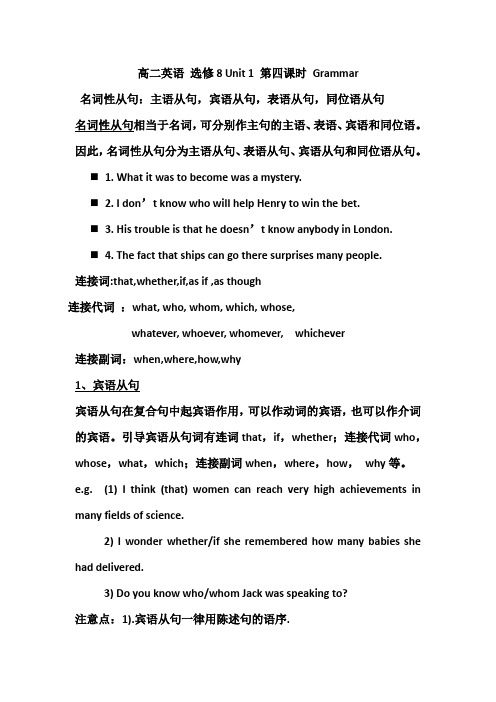
高二英语选修8 Unit 1 第四课时Grammar名词性从句:主语从句,宾语从句,表语从句,同位语从句名词性从句相当于名词,可分别作主句的主语、表语、宾语和同位语。
因此,名词性从句分为主语从句、表语从句、宾语从句和同位语从句。
⏹1. What it was to become was a mystery.⏹2. I don’t know who will help Henry to win the bet.⏹3. His trouble is that he doesn’t know anybody in London.⏹4. The fact that ships can go there surprises many people.连接词:that,whether,if,as if ,as though连接代词:what, who, whom, which, whose,whatever, whoever, whomever, whichever连接副词:when,where,how,why1、宾语从句宾语从句在复合句中起宾语作用,可以作动词的宾语,也可以作介词的宾语。
引导宾语从句词有连词that,if,whether;连接代词who,whose,what,which;连接副词when,where,how,why等。
e.g. (1) I think (that) women can reach very high achievements in many fields of science.2) I wonder whether/if she remembered how many babies she had delivered.3) Do you know who/whom Jack was speaking to?注意点:1).宾语从句一律用陈述句的语序.What is the matter 和what is wrong 除外2).whether和if都可以引导宾语从句但: (1).当whether后紧跟or not时,不用if.例: I don’t know whether I will stay or not.(2).介词后面的宾语从句不能用if.例: I worry about whether I hurt her feeling.3).that在宾语从句中的省略与保留引导宾语从句的连词that也无实际意义,多数情况下可以省略.由连词and连接的两个由that引导的宾语从句中,第一个that 可以省略,第二that不能省.He told me (that) he would come and that he would come on time.2、表语从句表语从句在复合句中起表语作用.引导宾语从句词有连词as if,as though,that,what, which, who, whom, whose等.除在句子中起连接作用外,还可在从句中从当主语、表语、定语,且各有各的词义。
- 1、下载文档前请自行甄别文档内容的完整性,平台不提供额外的编辑、内容补充、找答案等附加服务。
- 2、"仅部分预览"的文档,不可在线预览部分如存在完整性等问题,可反馈申请退款(可完整预览的文档不适用该条件!)。
- 3、如文档侵犯您的权益,请联系客服反馈,我们会尽快为您处理(人工客服工作时间:9:00-18:30)。
Book8 unit1 Grammar名词性从句名词性从句的功能: 功能相当于名词词组, 它在复合句中能担任主语、宾语、表语、同位语、介词宾语等。
名词性从句:表语从句、宾语从句、主语从句、同位语从句一、主语从句小组讨论,找出下列句子的主语并总结。
1.A mooncake is a delicious, round cake.2.I don’t know if it will grow.3.To give is better than to receive4.That light travels in straight lines is known to all.总结:主语可由____词、____词、数词、不定式、动名词和______等来承担。
一般位于谓动词________。
一、小组讨论并判断下列句子那些是主语从句。
Yes or No?1.That he finished writing the composition in such a short time surprised us all.2.I think that you must work harder.3.The fact is that we have lost the game.4.When they will come is unknown.5.Who will be our monitor hasn't been decided yet.6.Whatever you did is right.7.What we need is time.8.It is certain that he will win the match.二.课堂练习:(1)________he said was not true.(2)________he likes most is reading.(3)_______he is brave is true.(4)_______ will take part in the meeting has not been decided.(5)________she is from is unknown.(6)________she keeps healthy is a secret.(7)________can join in the sport meet is decided by the teacher.(8)________book I shall choose hasn’t been decided.三、主语从句特殊用法:1. It is very likely that they will hold a meeting.It + be + 名词/形容词+主语从句2. It seems that he has seen the film. 似乎It+不及物动词(seem, happen, matter)+主语从句3. It is said that President Obama will visit our school next week. 据说…It+过去分词+从句总结:it 做形式主语,为了防止句子头重脚轻,通常把形式主语it放在主语位置,真正主语搁置于句末。
四、主语从句在写作中的运用。
(1) ______________(众所周知)China launched their Shenzhou XI manned spaceship successfully on October 17,2016, carrying two Chinese astronauts, Jing Haipeng and Chen Dong. After 33-days stay in space, they returned to the earth . In their opinion, (2) _____________ (这是他们的荣幸) that they were chosen to be the astronauts of Shenzhou XI spaceship. During their trip,(3) ____________(令他们惊讶的事) was that the gravity became very strong when their rocket rose into the air. However, (4)_______________(让他们振奋的事) was seeing the earth from space. They also said that it didn’t matter(5) ______________ (多么困难) They would finish the task with heart and soul. All in all, it is a new chapter for China’s space industry.二、宾语从句1、定义:在复合句中作动词或介词宾语的从句叫宾语从句。
2、类别1)动词后的宾语从句:I heard_______ he would come here later on.2)介词后的宾语从句:He said nothing about ________ broke the window last night.某些形容词或过去分词后的宾语从句① I am not sure I ought to do.3、宾语从句的引导词(1) 从属连词that① He told us ________________________. 他对我们说他感到不舒服。
② I know_______________________.我知道他已经回来了。
(此处that可省略)分析:从句中________(缺/不缺)句子成分,____(有/无)实际意义,只起连接作用,所以填that(2)从属连词if/whether。
如:① I doubt _____________________. 我怀疑他是否会成功。
②I don’t know __________________. 我不知道你能否帮助我。
分析:从句中_______(缺/不缺)句子成分,意为______,只起连接作用,所以填if/ whetherwhether 与if 引导宾语从句的区别操练:用if/whether填空。
①_____________ she will come or not is still a question.她是否能来还是个问题。
②I'm interested in _____________ he likes English.我关心的是他是否喜欢英语。
③ Let me know _______________ or not he will come. 让我知道他是否能来。
④He hasn't decided ________ to visit the old man. 他尚未决定是否拜访那位人。
⑤______________ this is true or not,I can't say.这是否真的我说不上来。
⑥ People doubt __________________ he is a thief. 人们怀疑他是否是小偷。
⑦ He asked ______ I didn’t come to school yesterday.他问我昨天是否没来学校。
5、注意事项1)从句是并列句时,第二个分句前的that不可省略。
He phoned us to tell (that) it was time for us to set off and______ he would wait forus at the first crossing. (第一个that 可省略,第二个that 不可省略)2)在insist,demand,order,suggest, propose, advise, desire等表示坚持、命令、建议等意义的动词后,that宾语从句中谓语常用“(should)+动词原形”,表示虚拟。
Wangwei insisted that she __________________ (organize) the trip well.3)动词+it + 形容词或惯用搭配+that从句,it为形式宾语,that从句为真正的宾语。
I think___________ necessary that we take plenty of hot water every day .4)动词doubt用于否定结构或疑问结构时,宾语从句的引导词用that。
5)否定前移:I don’t think you are right.____________________.(翻译)三、表语从句1)The trouble is ______she has lost his money.麻烦的事是他丢了钱。
_不作成分2)The question is __________ we need more ice cream. _____不作成分1)The question is _______ of us should go.问题是我们哪一个应该去(作定语)2) The problem was _____ could do the work.问题是谁能做这项工作。
(作主语) 3)That's________ he is worrying about.那就是他在担心的事。
(作宾语)Time is _________ we should treasure.时间应该是我们珍惜的。
(作宾语)China is no longer _________ it used to be. 中国不再是过去的中国。
(作表语)1)Go and get your coat. It's _____ you left it. 去把雨衣拿来就在你原来放的地方。
2)I had neither a raincoat nor an umbrella. That’s__________ I got wet through.我们既没伞也没雨衣,这是我们淋湿的原因。
3) __________ is how mice ruin many stores of grain every year.那就是老鼠是怎样每年损害大量粮食的。
引导名词性从句的连接词连词:that/whether /if (主语从句没有if)连接代词:who/what/ which(哪一个)/whose wh+ever连接副词:when/where/how/why总结:(1)_______只起连接作用,不充当任何成分。
